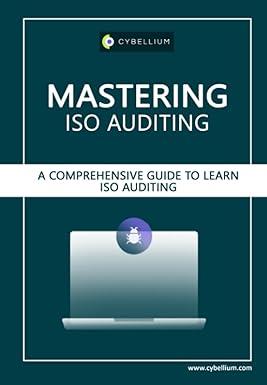Question
Write a one page summary about the following Case: Top of Form Documentary Film Losses Are Deductible, Not a Hobby Loss, Tax Court Holds by
Write a one page summary about the following Case:
Top of Form
Documentary Film Losses Are Deductible, Not a Hobby Loss, Tax Court Holds
by Wayne R. Strasbaugh
In a case that could have had a chilling impact to the documentary film industry, the U.S. Tax Court ruled that documentary filmmaking can be considered a trade or business in which losses are deductible.
In Storey v. Commission of Internal Revenue, decided on April 19, 2012, the court concluded that filmmaker Lee A. Storey had met her burden of proving that she set out to make a profit in her filming of Smile Til It Hurts, a 79-minute documentary about the singing group Up With People, and therefore entitled to deduct her filmmaking losses from income she earned as a lawyer for several years in which the film failed to make a profit.
Ms. Storey is a litigation partner in Ballard Spahrs Phoenix office and leads the firms water rights practice. She was a member of a smaller firm during the taxable years involved in the case. She was represented in Tax Court by Gregory A. Robinson of Farley Robinson & Larsen in Phoenix.
The IRS argued that the film was a "labor of love," and that Storey was motivated to make the film not for profit but by her desire to describe her husbands experience as a member of Up With People.
Judge Kroupa disagreed, saying "we find that petitioners efforts to make Smile Til It Hurts a financial success show a profit objective." The judges cleverly written opinion included whimsical headings from the film industry (e.g., "Lights, Camera " and "Action!").
The court also held that Ms. Storey "properly elected to immediately deduct the production costs under Section 181, rather than to capitalize them," and that her case marked "the first time that we have been asked to review an election under this provision."
Section 181, the court noted, "was enacted to encourage production of films and television programs within the United States rather than abroad. Congress noted that foreign governments have offered tax and other incentives to entice production of U.S. motion pictures and television programs to their countries and that runaway production has been estimated to drain as much as $10 billion per year from the U.S. economy."
The decision is a significant victory for documentary filmmakers who feared that Judge Kroupa was poised to rule the other way and hold that the making of documentaries cannot be considered a for-profit business. In a hearing last year, Judge Kroupa said: "By its very nature, a documentary to me means that its not for profit. Youre doing it to educate."
News of the judges comments prompted a quick response from the documentary filmmaking community. The International Documentary Association, joined by five other nonprofit organizations and numerous directors and producers, filed an amicus brief that said: "A judicial affirmation that categorically labels documentary filmmaking a non-profit activity could have a devastating impact on documentary filmmakers."
In her 46-page decision, Judge Kroupa weighed a series of factors set-forth in the regulations to determine whether Ms. Storeys filmmaking qualified as a true business.
Seven of the eight factors considered by the court weighed in Ms. Storeys favor and the judge concluded that her film production activity "was conducted with continuity and regularity," that she "developed her own expertise," and that her efforts to realize a profit from the film are continuing.
"The record shows an intent and effort by petitioner to engage in and continue in the filmmaking field with the purpose of producing income," Judge Kroupa wrote.
The judge rejected the IRSs argument that Ms. Storeys record of continuous losses from her filmmaking activity mandates a finding that she was not engaged in the activity for profit.
Instead, the judge credited Ms. Storeys argument that while her efforts have not proven profitable to date, she anticipates substantial income now that the film is complete, has received extensive praise, and is being marketed.
In deciding whether an activity is a true business or just a hobby, the court considers all the facts and circumstances. In analyzing how Ms. Storey conducted her business, the court also emphasized a number of important facts specific to this matter, including that Ms. Storey had a business plan, formed a limited liability company, maintained separate accounts, obtained insurance, entered into contracts and hired a bookkeeper and accountant.
Judge Kroupa held that artistic efforts in some cases should be accorded a longer startup stage, when based on a legitimate business model and plan. The three years at issue before the court were the fourth, fifth and sixth years of producing the film, the judge noted. While the hobby loss rules are not unique to the film industry, the case also involved section 181 of the Internal Revenue Code, an elective provision added in 2004 to allow the deduction of losses that in other industries would have to be capitalized.
"We treat the years at issue as part of the startup phase because she needed to complete the film before she could sell it and, on the record, this period is not unreasonably long. We also acknowledge that a startup period may be longer in the arts, depending on the taxpayers facts and circumstances," Judge Kroupa wrote.
While the IRS has not indicated whether it will appeal, the documentary film industry took a big sigh of relief last Thursday and is hopeful this decision is the final act.
Step by Step Solution
There are 3 Steps involved in it
Step: 1

Get Instant Access to Expert-Tailored Solutions
See step-by-step solutions with expert insights and AI powered tools for academic success
Step: 2

Step: 3

Ace Your Homework with AI
Get the answers you need in no time with our AI-driven, step-by-step assistance
Get Started


